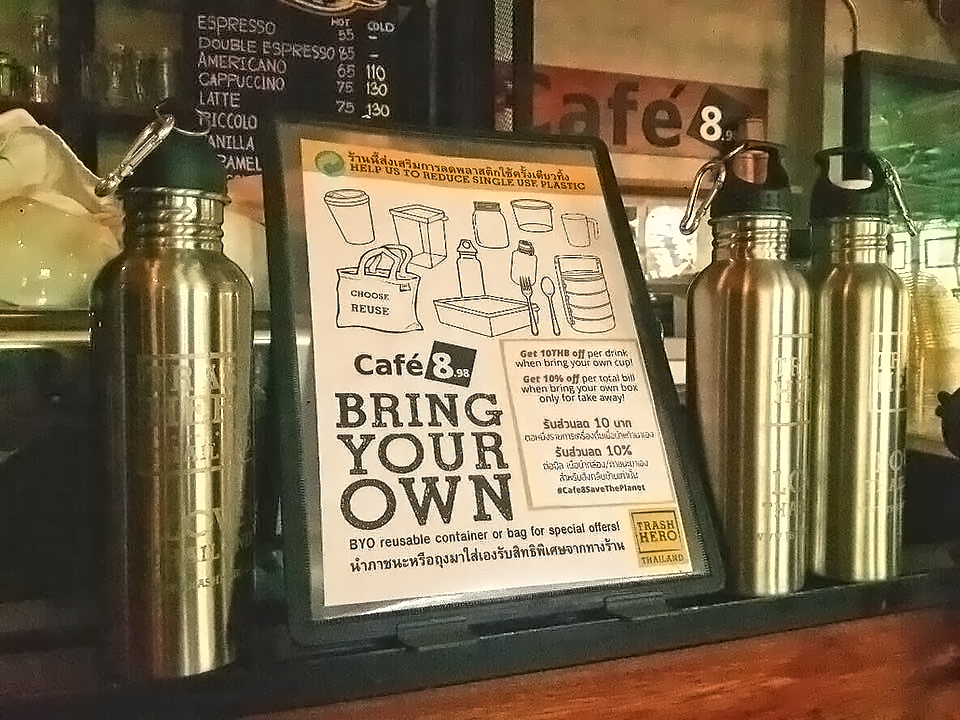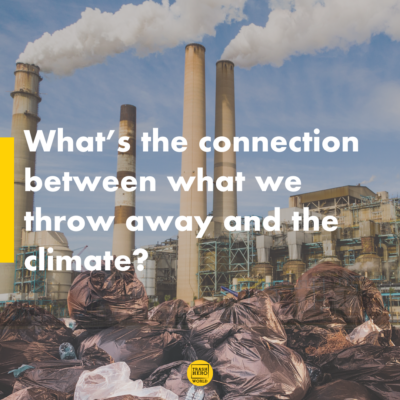We currently produce an enormous quantity of waste, especially plastic. This overproduction, and the resulting mismanagement, directly increase greenhouse gas emissions and the effects of climate change.
A recent Global Alliance Incinerator Alternatives (GAIA) report reveals the ‘clearest and most comprehensive evidence yet’ that a zero waste approach would totally transform this situation by reducing emissions and mitigating the effects of extreme weather.
In this blog post, we break down some of their key findings.
- Separate food waste to reduce methane emissions
Composting is a game-changer when it comes to reducing methane emissions and is better for the planet than recycling. When organic waste, like food scraps, decomposes in landfills, it produces a high amount of methane, which is released into the atmosphere. But by separating it, we can ensure it is composted to create nutrient-rich soil. According to the GAIA report, composting our organic waste will reduce methane emissions from landfills by a whopping 62%. And when we add mechanical recovery and biological treatment of residuals, we can reduce these methane emissions by an average of 95%!
- Reuse and refill to reduce emissions from fossil fuels

Plastic, over 95% of which is derived from fossil fuel, leaves a massive carbon footprint – creating emissions at every stage of its lifecycle. A staggering 44% of plastic is used for packaging or disposable items. By promoting refill and reuse systems and embracing a zero-waste approach, companies and local governments can easily reduce non-essential plastic use.
This will drastically decrease our fossil fuel-related emissions, as well as our dependency on oil and gas.
- Stop burning trash to cut greenhouse emissions
Incineration in various guises, such as ‘plastic-to-fuel’, is often promoted as a “solution” for plastic waste. The GAIA report shows that this is a very expensive, energy-intensive and inefficient process. It also creates a ‘lock-in effect’ that guarantees climate emissions for years to come. A study in Seoul, a city that relies significantly on incineration, found that the emissions from incineration were five times higher than from landfills. Although limited studies have been done on the impact of incineration, it is widely accepted that burning plastic has severe climate, environmental, and health impacts.
- Ban plastics to build resilience against extreme weather events

Flooding is becoming more frequent due to climate change, and studies have found that mismanaged waste exacerbates the situation. Plastic waste clogs drainage systems, so much so that Rwanda, Tanzania, and Uganda all banned plastic bags following severe flooding. Discarded waste is a breeding ground for insects known to spread diseases.
In Manila, for example, the dumping of solid waste was identified as a significant factor in the high levels of infections during floods and their aftermath. A zero-waste approach would eliminate this waste, meaning we can mitigate the impact of severe weather events.
- Use compost to improve soil health
The final benefit of zero waste that we will discuss here – as there are many more – is how composting can improve soil health. Our planet’s soil, a crucial element of ecosystems, is facing significant impacts from climate change. Soil moisture decreases due to higher air and soil temperatures, leading to aridity and desertification. This, coupled with erosion, could reduce food production by 25% by 2050. Compost provides an easy solution by improving soil organic matter, increasing its capacity for nutrient storage, and improving water absorption, strengthening soil resilience to climate change. Composting also reduces pollution, landfill waste, soil erosion, and surface and groundwater contamination, making it a valuable tool for adapting to climate change.
Do you want to start reducing waste? You can find out more about how to compost at home in our blogpost: The best recycling was invented by Mother Nature or you can read our tips for reducing plastic waste (it might not be the advice you expect!)
Want more information and waste and the climate? Read the executive summary of the ‘Zero waste to zero emissions’ or the full report.


Join the conversation